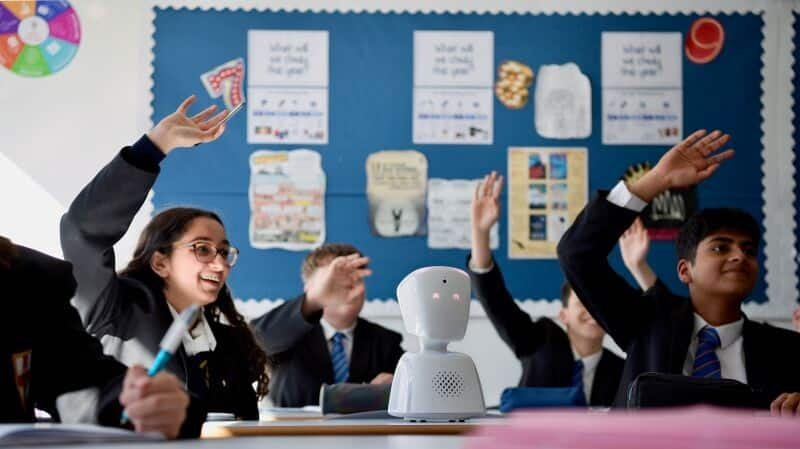
This robot helps sick kids attend school, interact with classmates
What's the story
Norwegian company No Isolation has developed an innovative solution, the AV1 robot, to address the challenges faced by chronically ill children who are unable to attend school.
This device acts as a substitute for the child in class, serving as their eyes, ears, and voice.
It is designed to keep these students connected with their classmates and prevent them from feeling isolated during their illness.
Tech specs
AV1 robot's design and functionality
The AV1 robot resembles a simplified human head and torso, equipped with a camera, microphone, and speaker. It can rotate 360 degrees to provide a comprehensive view of the classroom.
The device is controlled remotely via an app that requires a unique password for each student.
"They can tap or swipe their finger around the screen to look at different corners of the classroom," explained Florence Salisbury, marketing director for No Isolation.
User experience
AV1 robot's interactive features and global presence
The AV1 robot allows students to interact with their teachers and classmates through its speaker.
The app includes a "raise hand" feature that triggers a light on the robot's head, and emojis can be displayed in the robot's eyes for added expressiveness.
Currently, there are 3,000 active AV1 units across 17 countries, primarily in the UK and Germany.
Affordability
AV1 robot's cost and social impact
In the UK, schools have the option to rent an AV1 robot for approximately £150 ($200) per month or purchase it outright for £3,700 (nearly $4,960). An additional service package costs £780 (around $1,045) annually.
Salisbury highlighted the robot's significant role in maintaining social connections by sharing a story about a 15-year-old student in Warwickshire who used AV1 to stay included in his friends' social circle.
Pandemic response
AV1 robot's role in remote learning during COVID-19
The AV1 robot, which was introduced before the COVID-19 pandemic, has been utilized by some schools to assist students who have had difficulties readjusting to the classroom environment.
The Chartwell Cancer Trust in the UK has a stock of 25 AV1 robots that it provides to children with serious illnesses.
Founding trustee Michael Douglas stated that these robots enable children to stay engaged with their education even while in intensive care.
Implementation hurdles
Challenges and solutions in implementing AV1 robot
Despite its benefits, the AV1 robot's implementation can be hindered by administrative issues and technical infrastructure limitations.
A study published in Frontiers in Digital Health highlighted the need for structures to ensure equal access to avatar technologies like AV1.
To address these challenges, No Isolation launched the AV1 Academy last August, offering a range of training materials and resources aimed at enhancing the usability of their robot.